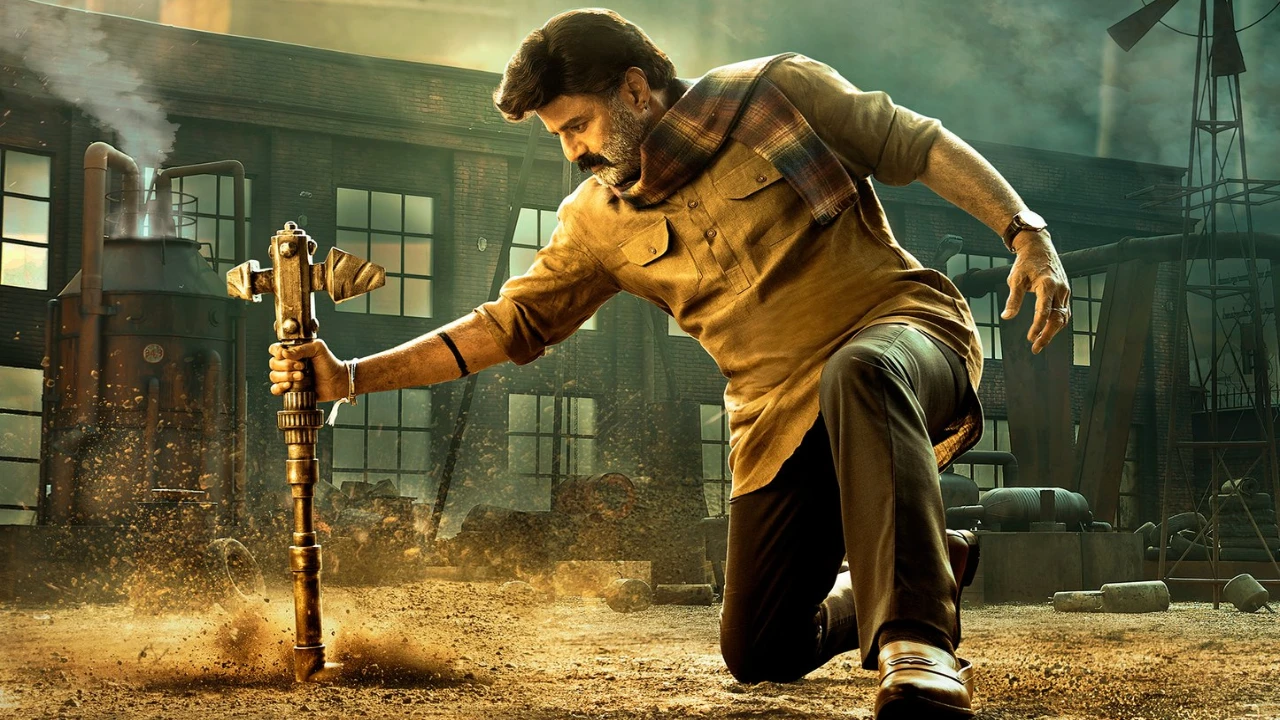Telugu Movie Review: Bhagavanth Kesari is just too formulaic to be redeemed by an engaging relationship between likable leads

At the heart of Bhagavanth Kesari is a tender relationship that really works. The title character, played by Balakrishna, is an adoptive father to Vijayalakshmi “Viji” (played by Sreeleela), the blood daughter of the deceased jailer who set him free. As Viji enters young adulthood, her bond with Bhagavanth – the man who has raised her for over a decade to be strong and independent – remains tighter than most between parents and children her age. But they are distanced by a longstanding disagreement: Bhagavanth wants Viji to enter the Army – something her late father requested, inspired by her late mother – but Viji’s past traumas won’t let her go down that road. Racked with anxiety, she feels that marrying her boyfriend, Karthik (Rahul Ravi), may be the better path. Bhagavanth has other plans.
If it seems like this dynamic is setting the stage for some broad, preachy themes of female empowerment, you’d be correct. Bhagavanth Kesari definitely spares no opportunity to convince the viewer of its feminist credentials, while not offering much of anything new in this department. But even in spite of the rather exaggerated nature of this messaging, both the humorous rapport and emotional moments between Bhagavanth and Viji ring true to a real father-daughter relationship, warts and all. Credit must go to both actors in developing this makeshift familial bond with seeming effortlessness: Balakrishna (widely commended for playing a character his age here) and Sreeleela feel unforced and natural together, both in terms of the love between their characters and their rift about Viji’s future.
Unfortunately, the organic feel of the central relationship doesn’t extend to any other aspect of Bhagavanth Kesari, and it’s really the only thing that keeps the movie from being a complete slog. The story itself is both incredibly simple and exceedingly convoluted; there’s nothing to it, and yet, enough machinations and small twists to last nearly three hours. The plot unsurprisingly hinges on Bhagavanth’s past – there was of course a reason why he was in jail in the first place – and the threat that this poses to he and Viji in the present. The villain, Rahul Sanghvi, is played by Arjun Rampal in a performance that manages to create even more of a vanilla “bad guy” than the script lays out, which is really saying something. He’s up to nefarious activities in trying to win a coveted government contract for what’s generically called “Project V” and – surprise, surprise – Bhagavanth and Viji will have to stop him in order to save themselves and others.
There’s also a sizable subplot involving a psychologist named Dr. Kathyayani (played by Kajal Aggarwal), who serves a dual purpose as Viji’s therapist and Bhagavanth’s love interest. Aggarwal’s performance isn’t particularly believable – either as a trusted confidante who Bhagavanth recruits to convince Viji that she actually does want to join the Army, or as a woman who would credibly fall in love with this rather larger-than-life man. But at the same time, the character is written as something of a cartoon, so it’s hard to fault the performance for everything. In an entirely predictable development, Dr. Kathyayani plays a key role in helping Bhagavanth and Viji rise to the occasion of taking on Sanghvi.
The action sequences in the film – of which there are many – are decently executed, but they are so repetitive that they get old quickly. Even though the softer, older, wiser side of Bhagavanth represents a bit of a welcome departure for Balakrishna, he does the same old schtick during the action. I could have done with fewer of these sequences, which ultimately do little to advance the plot until the third act. When Bhagavanth teams up with Viji closer to the end of the film, there is some pleasure in watching the two characters work together, but by this point, Bhagavanth Kesari has long overstayed its welcome. Even the most visually unique action set-piece – during a flashback, set in the forest – has a certain sameness to the mayhem that it likely won’t stay with me for a very long time.
Other key aspects of the film are similarly unremarkable. The soundtrack and musical numbers are fine and functional, with the lead single “Ganesh Anthem” going down easy (largely thanks to spirited performances from the leads) but not standing out as truly memorable. The locations and production design are adequate, but hardly visually exciting, especially when tacky CGI is used to create a silly balcony/walkway jutting out from Sanghvi’s penthouse. The cinematography is strictly middle-of-the-road – never less than competent, but also never truly aesthetically provocative or beautiful.
Ultimately, Bhagavanth Kesari just doesn’t have enough distinguishing qualities to make it a film worth seeing. Once the novelty of the central relationship has worn off, the plot’s familiarity and the oppressive length become increasingly large hurdles to the viewer’s engagement. Bhagavanth’s cool-guy mantra in the movie is “I don’t care” – unfortunately for the filmmakers, by the time we get to the halfway point, neither does the audience.

